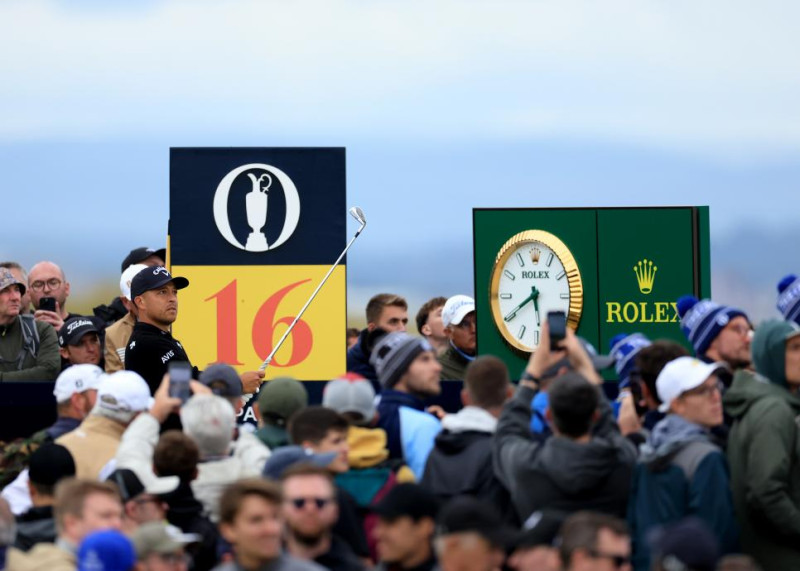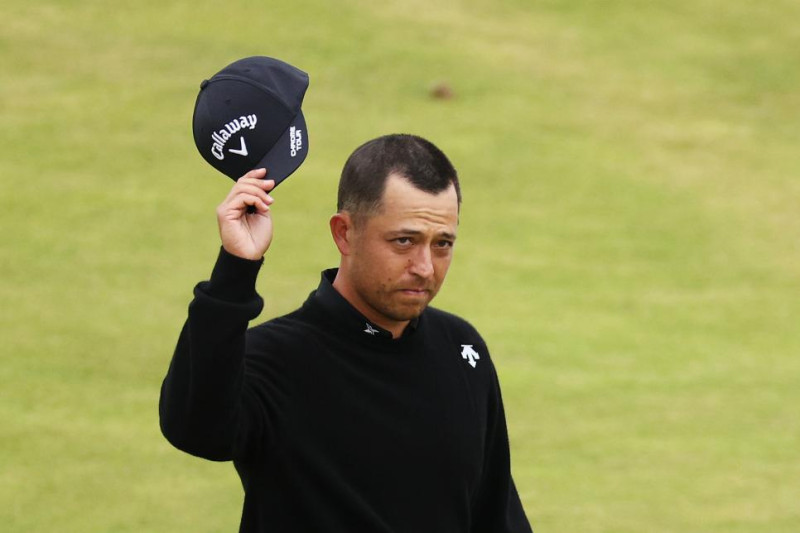TROON, Scotland — Twenty minutes, that’s all it took, in and out and mission complete before his Open competitors knew what they were trying to capture could no longer be obtained. Two birdies, off beautiful approaches, the disappearance of the ensuing putts prodding the usually-stoic Xander Schauffele to pump his fists as he willed what he wanted into existence. Twenty minutes when Thriston Lawrence began the 12th hole with a one-shot lead and left with a two-shot advantage, when the crowds—who had endured four days of wind and rain and more wind, and who were spiritedly behind Justin Rose’s pursuit of a championship he could not quit—realized what Schauffele was doing was the one thing they could not weather. Twenty minutes that capped two months of Schauffele
Schauffele, coupling a timely blitzkrieg with unwavering steadiness, turned a crowded tournament into an afternoon whose final hour was not in doubt, a bogey-free 65 earning him the title of Champion Golfer of the Year.
“It's an honor. I've always dreamt of doing it,” Schauffele said, glancing back at the claret jug next to him to make sure what happened had happened. “It really is one of the coolest feelings I've ever had in my life.”
In a sense we shouldn’t be surprised. Schauffele’s game is steady and rhythmic and complete, a game that can seem mundane because it's too good for drama. Schauffele is 12th off the tee on tour, fifth in approach and 10th in putting, and on those rare occasions where things go sideways he remains in control, ranking first in scrambling. He goes about his business with an ease you’re not supposed to have in this sport, dripping a California nonchalance with every stride and swing. It’s a vibe that cannot be learned or faked, and kept him cool in the face of ever-growing heat.
While this year has been a breakout for Schauffele, it’s also been one of turmoil. Because he had so many strong showings at majors that ended without a trophy, there had been a belief that perhaps Schauffele was a little too level-headed for his own good, failing to recognize big-time golf calls for big-time emotion. Early-season stumbles at the Players Championship (when he faltered on the final two holes with a chance to win) and Wells Fargo Championship (blinking as his one-shot lead evaporated into a seven-stroke deficit in a nine-hole stretch to finish a distant second to Rory McIlroy) only fueled that perception. There were also the optics of a poor Ryder Cup showing (1-3-0) made worse amid reports Schauffele was nearly kicked off the American team for demanding pay. On their own, each had an explanation or excuse. But in the aggregate it fueled a stigma that Schauffele, while very good, couldn’t be better when the spotlight shined brightest.
“Sometimes things go your way, and sometimes they don't,” Schauffele said, about some of those past falls. “But for the most part, all those tough losses in the past or those moments where I let myself slip up and dream too early on that back nine, I was able to reel myself in today and make sure that didn't happen.”
, although the game’s scholars know one major is never enough, especially for someone of Schauffele’s caliber. Their talents beget more summits to reach. Failing to add to that total is seen as squandered potential. On Sunday, Schauffele made no doubt about it, eventually looking up from his surgical performance to see he had left the rest of the competition in his wake.

David Cannon
“After I birdied 14, I was able to hit the fairway, and there's a big board right there on 15 by the green. I was sitting there kind of peeking at it. I was looking at the boards all day,” Schauffele said. “I've tried it in the past where I haven't done it, but at Valhalla I was looking at them all day, and I really wanted to embrace it. That's what I did there, so I told myself to do the same thing here. Really just look at it and embrace it and take it for what it is and move on.”
What followed was not necessarily theater, not in the classical sense. Schauffle safely found the green at the 17th, Lawrence unable to give himself viable looks at red. Schauffele even passed on marking his ball for the final putt, instead tapping in what remained and conferring the stage to Rose, who drained his putt and raised his hat to the crowds as if he was the victor. But as Rose walked off Schauffele turned to the grandstands on the left and right sides of the green and pounded his hands in their directions, and they returned the favor.
It lacked the tenor of love that Rose was given, but the gestures from Schauffele and the galleries were baked in respect. That was the throughline afterward for the vanquished, too.
“A guy at the top of his game,” Rose said of Schauffele. “I think probably one of his most unappreciated ones is his mentality. He's such a calm guy out there. I don't know what he's feeling, but he certainly makes it look very easy. He plays with a freedom, which kind of tells you as a competitor that he's probably not feeling a ton of the bad stuff. He's got a lot of runway ahead and a lot of exciting stuff ahead, I'm sure.”
Added Horschel: “I played with Xander in the 2017 FedEx St. Jude Classic, the week before Erin Hills. I think I played with him on Saturday or Sunday, he had just qualified for the U.S. Open, and I walked off the golf course after playing 18 holes with him, and I said, 'This kid is going to be really good.' I was really impressed with his game at that time. To see him improve, to see him grind and work hard and do everything the right way and have that attitude of trying to do everything you can to get better day in and day out, he deserves everything that he's gotten this year and what he's going to get in the future.”
And the winning description goes to Rose’s caddie Mark 'Fooch' Fulcher, who was irritated that on top of being such a good player that Schauffele is a good guy. “I kind of wish he was a wanker.”
Now with two major championships and nine career wins, there's an argument to be made he deserves Player of the Year honors. The type of performance cements Schauffele as a certified alpha and begs questions of where he can to from here. Schauffele, of course, had no appetite for such conjecture.
“Pretty much that's you guys' job to speculate on those things,” Schauffle said. “I'm just trying to win as many of these things as I can and play the best golf as I can and be a decent guy.”
For years, Schauffele had dreamed of the walk up 18th, to be surrounded by the blue stands and yellow leaderboards and know they were bowing to him. It was a dream that was shared,

Warren Little
That would be Stefan Schauffele, Xander’s dad. The Ogre as he’s affectionately known. For the better part of Xander’s career, Stefan was known as more than just a father or teacher, but a shadow, following his son wherever he went. It was Stefan that gave his son a sense of direction, the conviction and backing to know where he was going wasn’t a wish but a reality that could be attained. Their bond was visceral and true, but also one that drew criticism. As Xander’s shortcomings became numbered, there was talk that perhaps the son needed a little separation to deliver on his potential.
Following the Ryder Cup—where Stefan had given several interviews, confirming the noise of payments and exclusion—father and son had a talk. It was time for Stefan to take a step back and bestow Xander space. Stefan obliged, which is why when Xander lifted the Wanamaker in Louisville the father was .
“It's mature of [Stefan] to just step back and say, ‘Hey, we need something else here and we need to try something else to get you over that top,’” explained Schauffele’s caddie Austin Kaiser. “His dad's accepted that. [Stefan’s] in Hawaii now, building things and he's happy. That’s all Xander cares about. He just wants his dad happy.”
Maybe that’s why one of the first people Xander greeted in celebration was his father, who was tucked behind the clubhouse, watching the reality only he and Xander envisioned. Golf is a lot of things. At its heart, is a game of fathers and sons. To see Xander and Stefan embrace—Xander holding on tight, Stefan’s sunglasses unable to conceal the tears that flowed from behind—was a reminder of the spell this beautifully dumb game has on so many of us.
“I sat down with my dad when I was maybe 15 and 16, and we started to really hash out some goals and dreams of what I'd like to do,” Schauffle said. “I was on the couch with my dad a lot watching other guys win majors and win big tournaments. My dad and I, we've definitely talked about this. We've watched that walk up 18 pretty much every year until I've played in the Open.”
Only those two know the toll of all the previous shortcomings, of the weight that comes with unmet expectations and what it’s like to know that weight has been lifted. Xander joked he would allow Stefan to choose what they would drink first from the trophy, although was deadly serious when insisting Stefan would get the first sip. It’s ridiculous, of course, to distill what Schauffele did to 20 minutes. It took a lifetime of work and effort and disappointment and doubt to allow him to do what he did in those 20 minutes, and because of it, Xander Schauffele’s name is on the claret jug, now and forever.